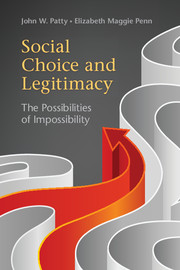Crossref Citations
This Book has been
cited by the following publications. This list is generated based on data provided by Crossref.
Ingham, Sean
2014.
Social Choice and Popular Control.
SSRN Electronic Journal,
Ingham, Sean
2014.
Theorems and Models in Political Theory: An Application to Pettit on Popular Control.
SSRN Electronic Journal,
Barkin, J. Samuel
2015.
On the Heuristic Use of Formal Models in International Relations Theory.
International Studies Review,
p.
n/a.
Ingham, Sean
2015.
Theorems and Models in Political Theory:.
The Good Society,
Vol. 24,
Issue. 1,
p.
98.
Vanberg, Georg
2015.
Constitutional Courts in Comparative Perspective: A Theoretical Assessment.
Annual Review of Political Science,
Vol. 18,
Issue. 1,
p.
167.
Johnson, James
2015.
Simon Hug's Retrospective on Pathologies of Rational Choice Theory: A Dissent.
Swiss Political Science Review,
Vol. 21,
Issue. 1,
p.
180.
Patty, John W.
and
Penn, Elizabeth Maggie
2015.
Aggregation, Evaluation, and Social Choice Theory.
The Good Society,
Vol. 24,
Issue. 1,
p.
49.
Knight, Jack
and
Johnson, James
2015.
On Attempts to Gerrymander “Positive” and “Normative” Political Theory:.
The Good Society,
Vol. 24,
Issue. 1,
p.
30.
Ingham, Sean
2016.
Social choice and popular control.
Journal of Theoretical Politics,
Vol. 28,
Issue. 2,
p.
331.
Lagerspetz, Eerik
2016.
Social Choice and Democratic Values.
p.
171.
Lagerspetz, Eerik
2016.
Social Choice and Democratic Values.
p.
383.
Patty, John W.
2016.
Emerging Trends in the Social and Behavioral Sciences.
p.
1.
Treibich, Rafael
and
Van der Linden, Martin
2017.
Trump Trumps Bush.
SSRN Electronic Journal ,
Beim, Deborah
Clark, Tom S.
and
Patty, John W.
2017.
Why Do Courts Delay?.
Journal of Law and Courts,
Vol. 5,
Issue. 2,
p.
199.
Jiang, Guifei
Zhang, Dongmo
and
Perrussel, Laurent
2018.
A Hierarchical Approach to Judgment Aggregation with Abstentions.
Computational Intelligence,
Vol. 34,
Issue. 1,
p.
104.
Ingham, Sean
2018.
Rule by Multiple Majorities.
Patty, John W.
and
Penn, Elizabeth Maggie
2019.
Measuring Fairness, Inequality, and Big Data: Social Choice Since Arrow.
Annual Review of Political Science,
Vol. 22,
Issue. 1,
p.
435.
Patty, John W.
and
Penn, Elizabeth Maggie
2019.
A defense of Arrow’s independence of irrelevant alternatives.
Public Choice,
Vol. 179,
Issue. 1-2,
p.
145.
Ingham, Sean
2019.
Why Arrow’s theorem matters for political theory even if preference cycles never occur.
Public Choice,
Vol. 179,
Issue. 1-2,
p.
97.
Whitfield, Gregory
2019.
TRENDS: Toward a Separate Ethics of Political Field Experiments.
Political Research Quarterly,
Vol. 72,
Issue. 3,
p.
527.





